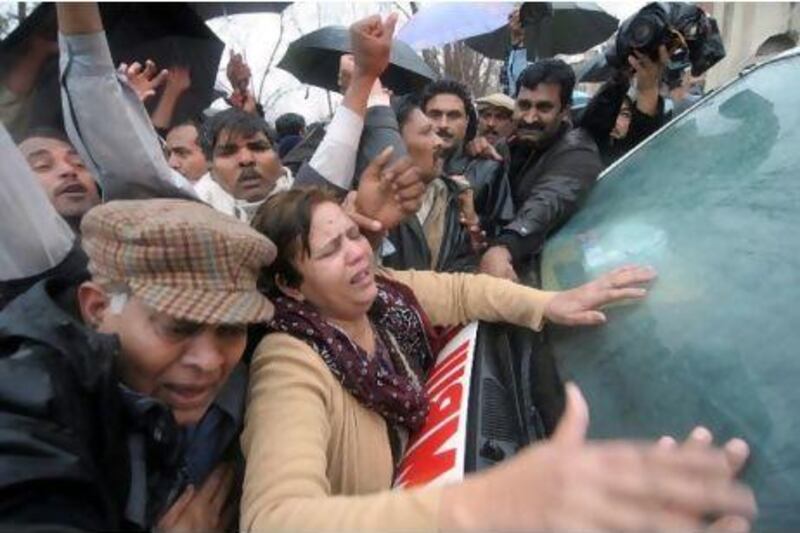ISLAMABAD // Gunmen shot and killed the only Christian member of Pakistan's federal cabinet yesterday outside his mother's home.
Leaflets at the scene indicate the men who killed Shahbaz Bhatti, a 42-year-old Roman Catholic, were from al Qa'eda and the Pakistani Taliban Movement in Punjab.
It was the second assassination in two months of a high-profile opponent of blasphemy laws that impose the death penalty for insulting Islam. Bhatti had been aware of the danger. In a message to be broadcast if he were killed, he said he was being threatened by the Taliban and al Qa'eda.
The threats would not deter him from speaking for persecuted minorities, he said. "I will die to defend their rights," he said on the videotape released yesterday.
His assassination further undermines Pakistan's tattered image as a moderate Islamic state.
Despite the threats, Bhatti, who had been assigned bodyguards, was without protection in Islamabad yesterday. Police said he did not want a security detail when visiting his mother.
Bhatti was in the back seat of a dark Toyota when he was attacked by four gunmen. His driver, identified as Gul Sher, told police that the gunmen blocked the Toyota.
Two of the men opened the car door, and a bearded man walked up and opened fire with a Kalashnikov. Police said Bhatti was hit 20 times and died at the scene. His driver was not injured.
The gunmen fled in a white Suzuki Mehran car, a witness said.
The leaflets at the scene blamed the government for putting Bhatti, an "infidel Christian", in charge of an unspecified committee, apparently referring to one said to be reviewing the blasphemy laws. The government has repeatedly said such a committee does not exist.
"With the blessing of Allah, the mujahideen will send each of you to hell," said the note, which did not name any other targets.
Bhatti joined the ruling Pakistan Peoples Party in 2002. He was appointed federal minister for minorities affairs in 2008. He retained his cabinet position after the prime minister Yusaf Raza Gilani trimmed the size of the cabinet last month.
In January, the governor of Punjab province, Salman Taseer, was assassinated by one of his security guards in Islamabad. Supporters of the killer showered him with rose petals during court appearances.
The killings underscore the threat faced by the progressive sections of Pakistani society, where extremism and intolerance are on the rise.
Critics contend that the blasphemy law has been used to settle personal disputes and has worsened interfaith relations.
Christians, Hindus and other minorities make up only 5 per cent of the mainly Muslim population in Pakistan.
The federal government had not provided a bulletproof vehicle for the vulnerable minister. Firdous Ashiq Awan, the minister for information, said an inquiry would be launched.
President Asif Ali Zardari, who is visiting Karachi, and Mr Gilani condemned the assassination.
"This is a concerted campaign to slaughter every liberal, progressive and humanist voice in Pakistan," said Farahnaz Ispahani, an aide to Mr Zardari. "The time has come for the federal government and provincial governments to speak out and to take a strong stand against these murderers to save the very essence of Pakistan."
Human rights organisations condemned the killing too. The "ruthless and cold-blooded murder is a grave setback for the struggle for tolerance, pluralism and respect for human rights in Pakistan," said Ali Dayan Hasan of Human Rights Watch in a statement. "Bhatti's murder is the bitter fruit of appeasement of extremist and militant groups both prior to and after the killing of Punjab Governor Salman Taseer," he said.
The US secretary of state, Hillary Clinton, said she was "shocked and outraged" by "an attack not only on one man, but on the values of tolerance and respect of people of all faiths and backgrounds. I recently had the chance to meet Minister Bhatti. He was a patriot, a man of great conviction and he had dedicated his life to those with the least among us."
Several Muslim leaders in Pakistan either offered tepid condemnations or alleged the assassination was part of an American-led conspiracy to drive a wedge between Muslims and Christians.
Any supporter of reforming the blasphemy law is taking a risk. In recent months, religious parties have staged massive rallies across the country in opposition to any changes in the law.
Accordingly, the ruling party is reluctant, despite its initial indications, to reform the law. Mr Gilani has tried to assuage the religious elements by stating that his government does not intend to amend the blasphemy law, which was introduced in 1986 by the military dictator General Zia ul Haq.
Bhatti, like other rights activists, strongly maintained that the law was being misused and had urged a review. In a 2009 interview he described his plan on developing consensus within the country before amending the law.
No one has been executed for blasphemy in Pakistan because courts typically throw out cases or commute the sentences. But some who are released are later killed by extremists or have to go into hiding. Others spend long periods in prison while waiting for their cases to wind through the courts.
But as opposition to any changes mounted and Bhatti's ruling political party dithered, he found himself vulnerable.
With the death of Bhatti, Pakistani Christians lost their most prominent advocate. Christians have very little political power and tend to work in lower-level jobs.
"We have been orphaned today!" wailed Rehman Masih, a Christian living in Islamabad. "Now who will fight for our rights? Who will raise a voice for us? Who will help us?"
Bhatti, who represented the Punjab city of Faisalabad, was unmarried. His father died last month. He is survived by his mother, four brothers and a sister.
* With additional reporting by the Associated Press





